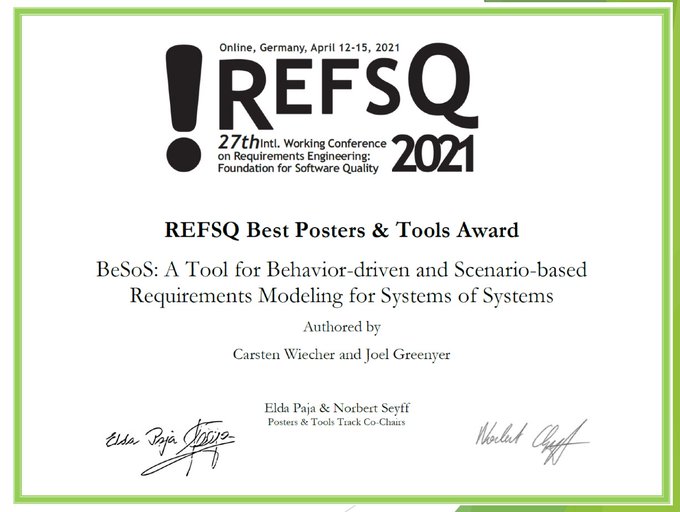This paper on Multi-Robot Motion and Task Planning in Automotive Production Using Controller-based Safe Reinforcement Learning, written with Eric Wete, Daniel Kudenko and Wolfgang Nejdl, was accepted at the 3rd International Conference on Autonomous Agents and Multiagent Systems (AAMAS 2024).
Author Archives: jgreen
Two papers accepted to MODELS’21
We have two papers accepted to the MODELS’21 conference:
- The first submission is titled “Monte Carlo Tree Search and GR(1) Synthesis for Robot Tasks Planning in Automotive Production Lines” and is the result of a collaboration with Eric Wete at Volkswagen and Andreas Wortmann. It presents an approach to combine formal controller synthesis and AI planning to arrive at correct and optimized choreographies for multi-robot cells in automotive production lines.
- The second submission, titled “Integrated and Iterative Requirements Analysis and Test Specification: A Case Study at Kostal” is the result of a collaboration with Carsten Wiecher, Jannik Fischbach, Andreas Vogelsang, Carsten Wolff, and Roman Dumitrescu. If presents an approach for the iterative requirements specification and analysis based on test-driven modeling and execution of scenario-based specification and applying Spectmate’s NLP capabilities for deriving tests from textual component requirements.
REFSQ 2021 Best Tool Demo Paper
Our REFSQ 2021 Tool Demo contribution titled “BeSoS: A Tool for Behavior-driven and Scenario-based Requirements Modeling for Systems of Systems” was awarded the REFSQ’21 Best Posters and Tools Award (Program Committee choice).

Also see the demo video here.
MEKES 2018 Workshop Paper Preprint and Video available
We uploaded a preprint of our paper “A Scenario-Based MDE Process for Dynamic Topology Collaborative Reactive Systems — Early Virtual Prototyping of Car-to-X System Specifications”, which was accepted at the MEKES 2018 Workshop.
We also created a video presentation of our work, including a demo of the implemented prototype.
Highlights:
- The coordination logic of a car-to-x system is modeled using SML scenarios
- These scenarios are compiled to specialized Java code that executes the scenarios.
- The code is executed in a distributed setting, running on a laptop and Android devices
- The scenario execution is integrated with a 3D driving simulator (OpenDS): collisions of cars with marker objects in the 3D simulation are translated to environment events that are injected into the play-out of the car-to-x coordination logic.
Interview on Digitalization and Philosophy in fiph Journal
I was interviewed by the philosophy research institute in Hannover on digitalization, the effect of social media on democracy and the role of philosophy in this context. The interview appears in the fiph Journal:
see interview and fiph Journal edition of Fall 2017.
ScenarioTools Science of Computer Programming article published
Our article “ScenarioTools — A Tool Suite for the Scenario-based Modeling and Analysis of Reactive Systems” was now published in the Original Software Publication track of the Science of Computer Programming journal:
http://dx.doi.org/10.1016/j.scico.2017.07.004
MDETools’17 paper accepted
Our paper “A Scenario-based MDE Process for Developing Reactive Systems: A Cleaning Robot Example” was accepted at the 1st Model-Driven Engineering Tools Challenge Workshop (MDETools’17), co-located with MODELS 2017.
ESEC/FSE 2017 tool demo paper accepted
Our tool demo paper From Scenario Modeling to Scenario Programming for Reactive Systems with Dynamic Topology was accepted at ESEC/FSE 2017. See you in Paderborn!
See demo video and artifact at http://scenariotools.org/esecfse-2017-tool-demo/.
AIRE 2017 paper accepted (RE’17 workshop)
Our paper Toward Learning Realizable Scenario-based, Formal Requirements Specifications was accepted at the AIRE 2017 workshop, co-located with RE’17.
MODELS 2017 paper accepted
Our paper titled Symbolic Execution for Realizability-Checking of Scenario-based Specifications was accepted at MODELS 2017. See you in Austin!
